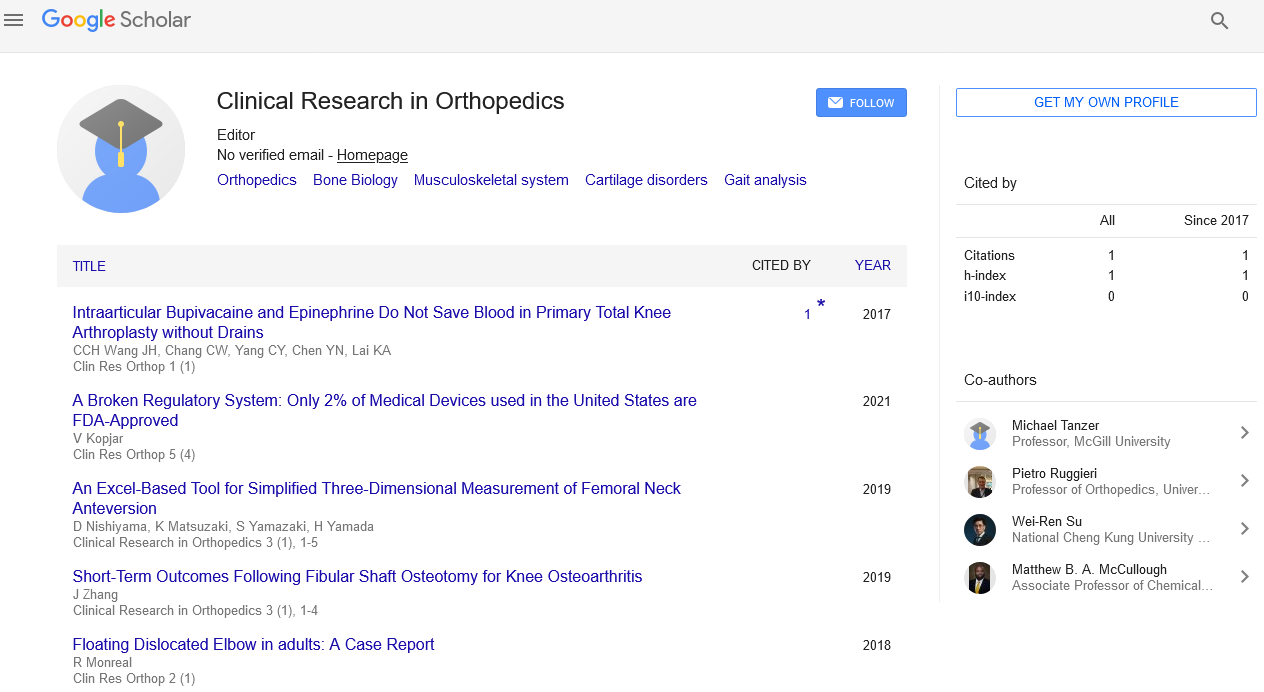Perspective, Clin Res Orthp Vol: 7 Issue: 1
Contemporary Approaches to Managing Orthopedic Trauma in Elderly Patients
Robert George*
Department of Medicine, University of Pennsylvania, Philadelphia, Pennsylvania, USA
*Corresponding Author: Robert George
Department of Medicine, University of
Pennsylvania, Philadelphia, Pennsylvania, USA;
E-mail: georgerobert@yahoo.com
Received date: 15 February, 2023, Manuscript No. CRO-23-96673;
Editor assigned date: 17 February, 2023, Pre QC No. CRO-23-96673(PQ);
Reviewed date: 03 March, 2023, QC No. CRO-23-96673;
Revised date: 10 March, 2023, Manuscript No: CRO-23-96673(R);
Published date: 17 March, 2023, DOI: 10.35248/cro.1000072
Citation: George R (2023) Contemporary Approaches to Managing Orthopedic Trauma in Elderly Patients. Clin Res Orthp 7:1.
Description
As the population continues to age, orthopedic trauma in elderly patients has become an increasingly prevalent issue. In fact, orthopedic injuries are one of the leading causes of hospitalization in older adults. However, managing orthopedic trauma in elderly patients requires a unique approach due to the challenges that come with treating older patients. Contemporary approaches to managing orthopedic trauma in elderly patients aim to improve outcomes and reduce complications associated with orthopedic injuries. These approaches typically focus on individualized care plans that address the specific needs and concerns of older patients.
One of the primary considerations when managing orthopedic trauma in elderly patients is the risk of complications associated with surgery. Many older patients have pre-existing health conditions that can increase the risk of post-operative complications. Additionally, the recovery process can be more challenging for older patients due to a slower healing process and reduced mobility. To address these concerns, non-surgical management options may be considered for certain types of orthopedic trauma. For example, in cases of minor fractures or sprains, conservative management strategies such as rest, immobilization, and pain management may be appropriate. This can help minimize the risks associated with surgery and reduce the overall recovery time.
When surgery is necessary, a multidisciplinary approach is typically employed to address the unique needs of older patients. This may involve a team of healthcare professionals, including orthopedic surgeons, anesthesiologists, physical therapists, and geriatric specialists. Geriatric specialists play a particularly important role in managing orthopedic trauma in elderly patients. These specialists are trained to address the specific concerns of older patients, such as cognitive impairment, polypharmacy, and frailty. They can provide guidance on pre-operative optimization, peri-operative management, and post-operative care. One approach that has gained popularity in recent years is the concept of "prehabilitation" for older patients undergoing orthopedic surgery. Prehabilitation involves a period of targeted exercise and physical therapy prior to surgery to help optimize the patient's physical and mental health. This can help reduce the risk of post-operative complications and improve overall outcomes.
In addition to surgical and non-surgical management strategies, pain management is an essential component of managing orthopedic trauma in elderly patients. Older patients may be more susceptible to adverse effects from pain medications, so alternative approaches such as physical therapy, acupuncture, or cognitive-behavioral therapy may be employed to manage pain. Another important consideration in managing orthopedic trauma in elderly patients is the impact of the injury on overall functional status. Many older patients may already have reduced mobility and functional impairments, and orthopedic injuries can further exacerbate these issues.
Rehabilitation and physical therapy can be critical in helping older patients regain their mobility and independence following an injury. Finally, a focus on patient-centered care is essential in managing orthopedic trauma in elderly patients. This involves tailoring treatment plans to the specific needs and preferences of the individual patient. For example, older patients may have a greater desire to maintain their independence and quality of life, which should be taken into consideration when developing a treatment plan.
In conclusion, managing orthopedic trauma in elderly patients requires a unique approach that considers the specific needs and concerns of older patients. Contemporary approaches to managing orthopedic trauma in elderly patients typically involve a multidisciplinary team, conservative management strategies, prehabilitation, pain management, rehabilitation, and a focus on patient-centered care. By taking a comprehensive approach to managing orthopedic trauma in elderly patients, healthcare providers can help improve outcomes and reduce complications associated with orthopedic injuries in this population.
 Spanish
Spanish  Chinese
Chinese  Russian
Russian  German
German  French
French  Japanese
Japanese  Portuguese
Portuguese  Hindi
Hindi 